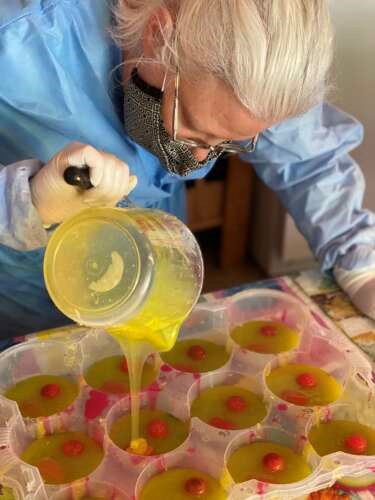The cancellation of in-class instruction due to COVID-19 has not stopped the University of Guelph’s Ontario Veterinary College (OVC) from providing hands-on veterinary training.
This year, 120 second-year OVC students will receive kits developed by the college’s veterinarians and technicians in order for the students to practice surgical skills at home that are usually taught through in-person labs of 30 students.
The OVC will also increase access to computerized case simulations and virtual teamwork.
“COVID-19 has not stopped us,” said Andria Joy, coordinator of clinical skills training in the department of clinical studies. “We found a way to make it work.”
The kits will include items such as drapes, clamps, gloves, masks and gowns which are needed for students to learn and practise aseptic preparation of themselves and animals for surgery.
The kit will also include a simulated abdomen developed years ago which allows students to practise surgery without using live animals. Kits will be distributed during scheduled in-person visits to the college.
Joy created the kits alongside clinical skills manager Alie Gillan and technicians Nicole Kudo and Meghan Longley that include oncology silicon models with two masses, simulated skin, fascia and muscle layers. The models will allow student veterinarians to practise incisional and excisional biopsies skills.
While some labs will include in-person instruction for small groups of students, Joy said she expects the kits to offer increased flexibility for students perfecting their skills at home.
Using live video, students working with the kits will interact online with instructors for feedback and grading purposes.
“Home learning may have benefits for veterinary students, including more opportunities to practise surgical skills not normally available outside of fully equipped but busy clinical skills labs on campus. This new kit makes the practice more accessible to them, particularly during the ongoing pandemic restrictions.
These are surgical skills that need practice,” said Joanne Hewson, OVC associate dean.
“We are finding creative ways to provide opportunities for students to practise and receive feedback despite COVID.”
The college also hired co-op students for the summer who will work with faculty members to design computerized simulated cases.
OVC normally uses case simulations to allow students to develop skills in diagnosing and treating ailments in different animals. This year, the college purchased further software licences to develop cases — such as disease scenarios — that will allow more students to further their clinical problem-solving skills.
The OVC also planned virtual teamwork and leadership activities for orientation week, including improvisational activities and online gatherings of first-year students with second-year mentors.
Hewson said this year’s pandemic-induced skills training and orientation provisions reflect creative solutions and a combined effort from faculty, instructors, course coordinators, department chairs and senior leadership across OVC.
“Our faculty and staff have a commitment to see students succeed without compromising the quality of training,” said Hewson.
“Our standards are still as high, and we’re still as determined to make the curriculum work.”
